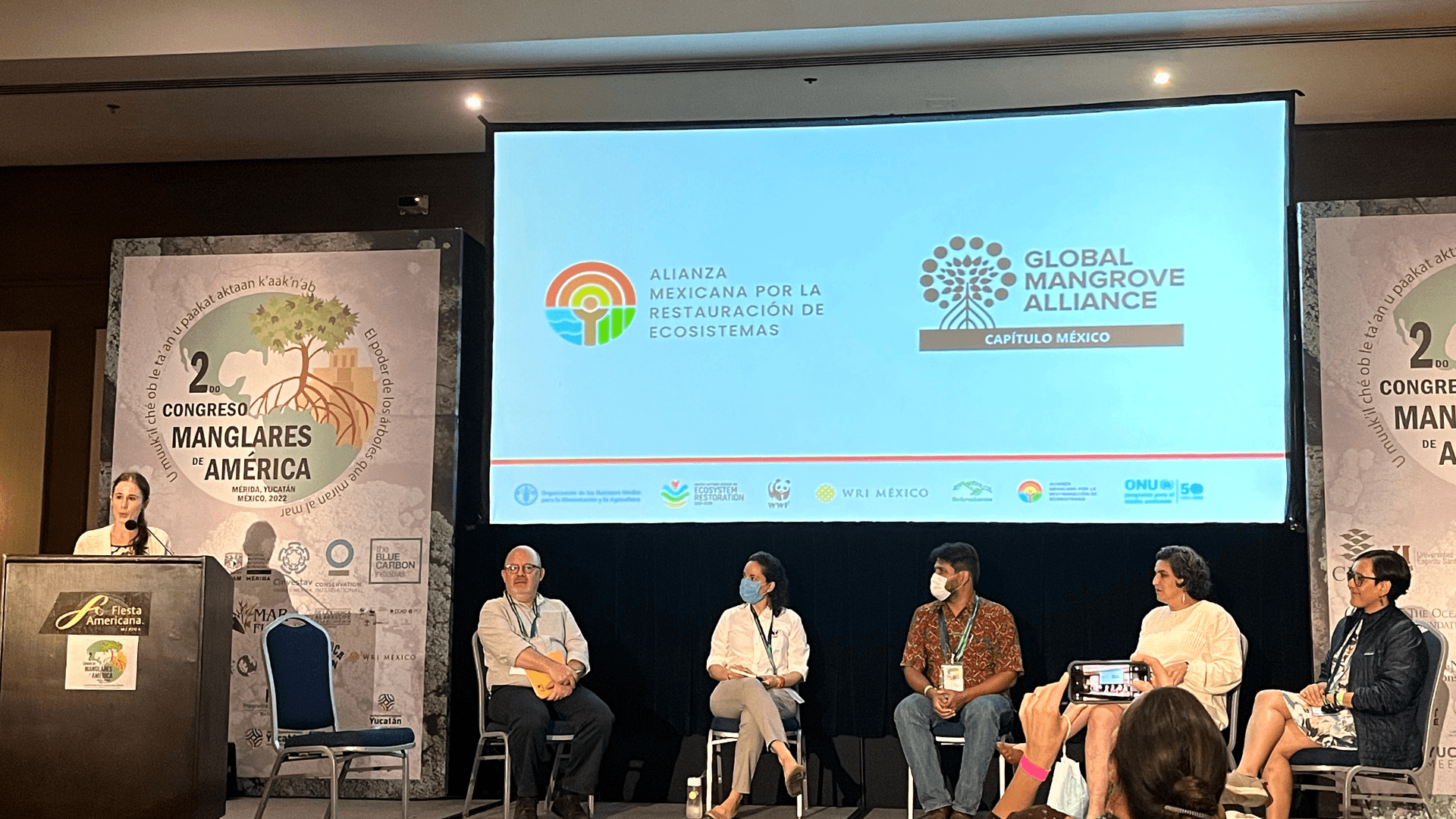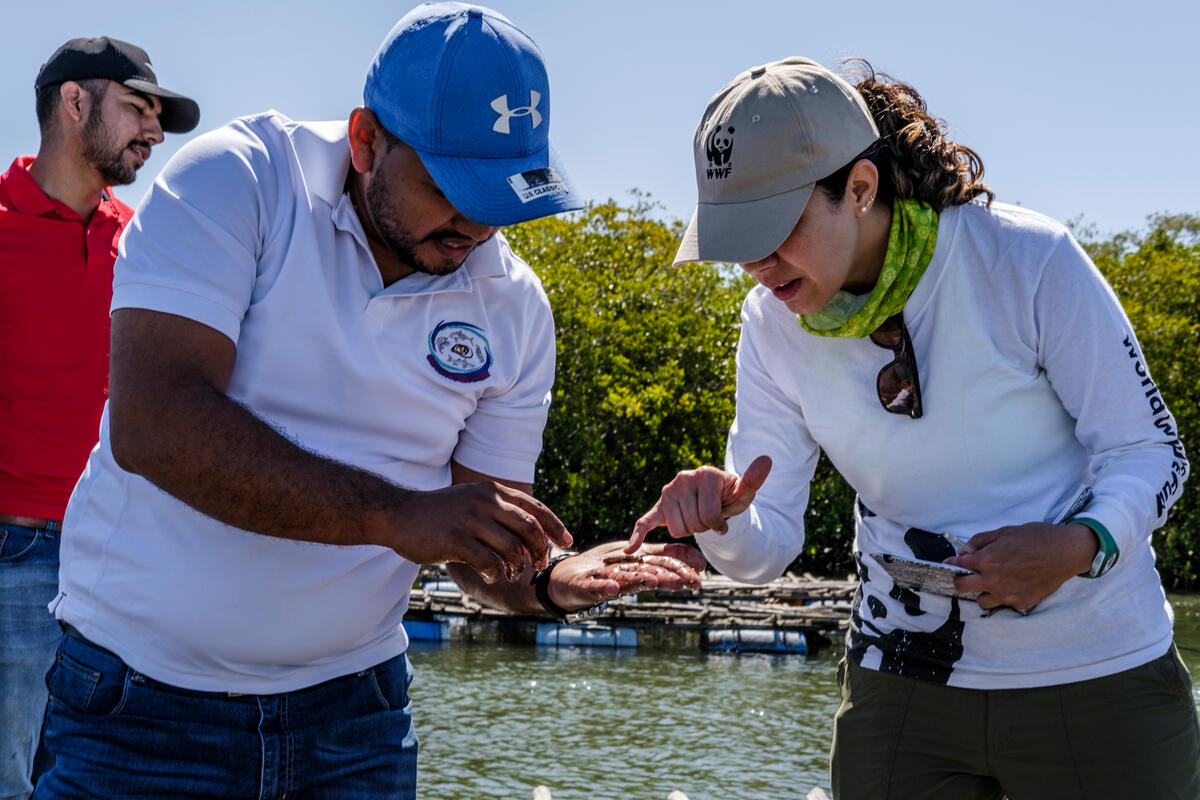The Mexico National Chapter of the Global Mangrove Alliance was launched at the Second Mangroves of the Americas Congress in Mérida, Mexico on October 13, 2022. The event brought together the organizers from WWF-Mexico, TNC-Mexico, WRI-Mexico, Wild Coast, and Conservation International-Mexico. A panel event introduced the Chapter, and a half day workshop took place the following day.
This chapter will be nested within the Coastal Marine Working Group of the Mexican Alliance for Ecosystem Restoration (AMERE), whose first meeting was also held during the Congress. AMERE is led by WWF, World Resources Institute (WRI), and Reforestemos México.

Panelists: WRI-Mexico Forests lead: Javier Warman - representative of AMERE, WWF-Mexico, Adaptation Coordinator: Alejandra Calzada, TNC-Mexico, Climate Change Lead: Yves Paiz, CI-Mexico, Vicepresident: Leticia Gutierrez, Wild Coast, Climate Change Manager: Tannia Frausto
© Emma Barnes / WWF-US
It is increasingly clear that national and local stakeholders will be the catalyst in implementing improved management, conservation, and restoration of mangroves. National Chapters are the exciting new pathway forward that the Global Mangrove Alliance will use to activate that catalyst and move towards our goal of Halting Loss, Restoring Half, and Protecting Double of mangrove ecosystems globally.
Conservation around Mexico is already in progress at local, regional, and national levels. The Mexico National Chapter of the Mangrove Alliance will provide an opportunity for all groups working in mangrove conservation to come together under a common vision and generate national attention while still focusing within their own niche towards 2030 restoration, biodiversity, and climate goals.
In addition to conservation, “work with the people and for the people” was repeated throughout the launch events. Mexico’s coastal communities are closely tied to the benefits the mangrove ecosystems on both the Gulf of Mexico/Caribbean and Pacific coasts provide and the National Chapter is dedicated to incorporating community perspectives and leadership into long-term goals and management. This will be done by linking social issues with environmental issues when financing projects, strengthening policies, and implementing conservation objectives.

Pedro Alfonso Lopez Gonzalez (left), president of Sociedad Cooperativa de Produccion Pesquera en General y Acuicola Ostricamichin showing Pilar Jacobo (right), WWF Mexico Nature-based Solutions Coordinator their oyster farming operation near Boca de Camichin, Nayarit, Mexico.
© Jason Houston / WWF-US
Now that the Chapter has launched, next steps are to design the governance and a work plan for the National Chapter and the AMERE Coastal-Marine Working Group. This will happen in the upcoming days, where the stakeholders will participate in a workshop to start drafting the work plan. Future activities could include the development of national tools or products like a restoration agenda for Marismas Nacionales. More information will be shared as plans develop.
This article was originally published by Global Mangrove Alliance.
If you are interested in joining the Mexico National Chapter of the Global Mangrove Alliance, contact Pilar Jacobo at [email protected]
The UN Decade on Ecosystem Restoration 2021-2030, led by the United Nations Environment Programme, the Food and Agriculture Organization of the United Nations and partners, covers terrestrial as well as coastal and marine ecosystems. As global call to action, it will draw together political support, scientific research and financial muscle to massively scale up restoration. Find out how you can contribute to the UN Decade. Follow #GenerationRestoration.
